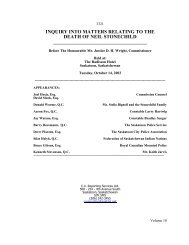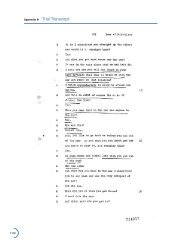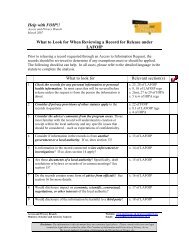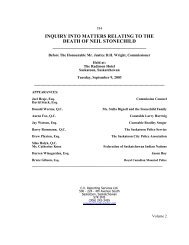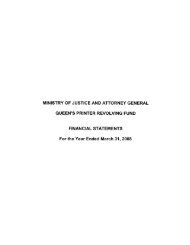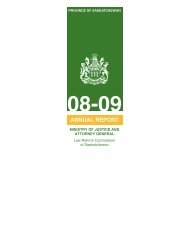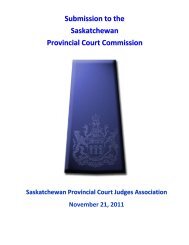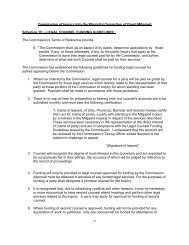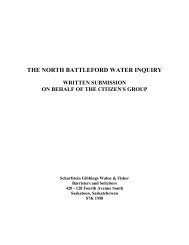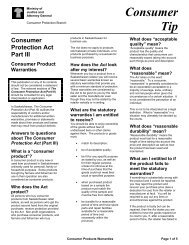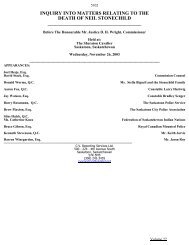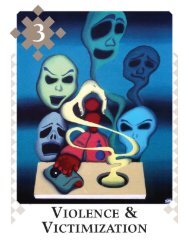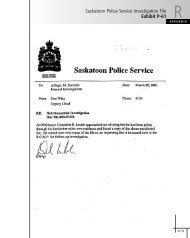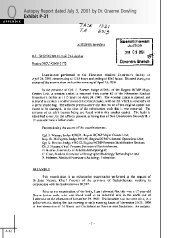Appendix K Memorandum of Law - s. 9(2) of the Canada Evidence Act
Appendix K Memorandum of Law - s. 9(2) of the Canada Evidence Act
Appendix K Memorandum of Law - s. 9(2) of the Canada Evidence Act
Create successful ePaper yourself
Turn your PDF publications into a flip-book with our unique Google optimized e-Paper software.
<strong>Appendix</strong> K <strong>Memorandum</strong> <strong>of</strong> <strong>Law</strong><br />
can appeal to <strong>the</strong> judge, but nothing can be done. The witness appears to be very pleasant, and is not any way<br />
nasty, and cannot be described as hostile, but he gives a story which is <strong>the</strong> direct anti<strong>the</strong>sis to that contained in<br />
his signed statement. Under this amendment it will be possible for counsel to cross-examine his own witness on<br />
a statement which he has previously made and signed. 54<br />
Bill S-3 and <strong>the</strong> amendments to <strong>the</strong> <strong>Canada</strong> <strong>Evidence</strong> <strong>Act</strong> were given about an hour <strong>of</strong> debate in <strong>the</strong><br />
House <strong>of</strong> Commons on January 20, 1969. 55 The justice minister <strong>of</strong> <strong>the</strong> day, John Turner, made <strong>the</strong><br />
following introductory remarks regarding Bill S-3 and <strong>the</strong> purpose <strong>of</strong> <strong>the</strong> proposed amendment to<br />
section 9 <strong>of</strong> <strong>the</strong> CEA:<br />
The bill is also designed to assist <strong>the</strong> courts in reaching <strong>the</strong> truth by removing an obvious impediment in <strong>the</strong> way<br />
<strong>of</strong> a proper assessment <strong>of</strong> <strong>the</strong> credibility <strong>of</strong> witnesses. At present a party who produces a witness is not permitted<br />
to prove that <strong>the</strong> witness had previously made a written or oral statement inconsistent with <strong>the</strong> testimony that<br />
he is giving <strong>the</strong> court unless that witness, in <strong>the</strong> opinion <strong>of</strong> <strong>the</strong> court, upon <strong>the</strong> application <strong>of</strong> <strong>the</strong> party who has<br />
introduced <strong>the</strong> witness’s testimony, is adjudged adverse.<br />
For <strong>the</strong> benefit <strong>of</strong> those who do not practice law as a pr<strong>of</strong>ession, or did not do so before entering <strong>the</strong> house,<br />
I should mention that <strong>the</strong> word ‘adverse’ here means that a witness has a hostile animus, or a hostile bearing<br />
or intent, toward <strong>the</strong> party who calls him and is not prepared to give his evidence fairly, or with <strong>the</strong> appropriate<br />
desire to tell <strong>the</strong> truth. 56<br />
After describing <strong>the</strong> law surrounding <strong>the</strong> permitted uses <strong>of</strong> prior inconsistent statements and s. 9 <strong>of</strong> <strong>the</strong><br />
CEA, <strong>the</strong> Justice Minister went on to state:<br />
The defect in <strong>the</strong> present law is that <strong>the</strong> courts have generally held that in deciding whe<strong>the</strong>r or not <strong>the</strong> witness<br />
is adverse <strong>the</strong>y are not entitled to consider any previous statements made by <strong>the</strong> witness. They have restricted<br />
<strong>the</strong>mselves to considering such matters as <strong>the</strong> demeanour <strong>of</strong> <strong>the</strong> witness, <strong>the</strong> way he is testifying in <strong>the</strong> court,<br />
and so on. The indefensible result <strong>of</strong> all this is that <strong>the</strong> highly polished witness, <strong>the</strong> highly polished prevaricator,<br />
frequently dazzles <strong>the</strong> court into deciding that <strong>the</strong>re is absolutely no justification for holding that he is adverse.<br />
…<br />
In <strong>the</strong>se circumstances it is proposed to amend section 9 <strong>of</strong> <strong>the</strong> act to empower <strong>the</strong> court to permit a party<br />
to cross-examine his witness as to a previous inconsistent statement, but only if that statement is reduced to<br />
writing, so that <strong>the</strong> court can consider <strong>the</strong> results <strong>of</strong> <strong>the</strong> cross-examination and, on <strong>the</strong> basis <strong>of</strong> that previous<br />
inconsistent written statement, decide whe<strong>the</strong>r <strong>the</strong> witness in fact is adverse. Such cross-examination would,<br />
<strong>of</strong> course, be limited to that previous written statement. If <strong>the</strong> court decides <strong>the</strong> previous statement is not<br />
inconsistent with <strong>the</strong> present testimony, that is <strong>the</strong> end <strong>of</strong> <strong>the</strong> matter. But if <strong>the</strong>re is an inconsistency, <strong>the</strong>n <strong>the</strong><br />
party who calls that witness may discredit <strong>the</strong> witness by contradicting him with <strong>the</strong> statement in question or any<br />
o<strong>the</strong>r previous oral or written statement, or may establish from <strong>the</strong> testimony <strong>of</strong> <strong>the</strong> witness under oath that all or<br />
part <strong>of</strong> <strong>the</strong> previous statement represents <strong>the</strong> truth. 57<br />
From <strong>the</strong>se comments, it appears that s. 9(2) <strong>of</strong> <strong>the</strong> CEA was enacted as a reformatory measure<br />
designed to resolve <strong>the</strong> procedural ‘catch-22’ respecting <strong>the</strong> technical requirements <strong>of</strong> s. 9(1) and <strong>the</strong><br />
judicial consideration surrounding that provision. The Justice Minister’s remarks before <strong>the</strong> Standing<br />
Committee for Justice and Legal Affairs tend to fortify this view:<br />
Mr. Turner: Mr. Chairman, section 9 <strong>of</strong> <strong>the</strong> present <strong>Canada</strong> <strong>Evidence</strong> <strong>Act</strong> prohibits a party producing a witness<br />
from impeaching <strong>the</strong> credit <strong>of</strong> that witness unless in <strong>the</strong> opinion <strong>of</strong> <strong>the</strong> court <strong>the</strong> witness proves to be adverse or<br />
54 Senate Debates, supra note 53 at pp. 577 to 588.<br />
55 House <strong>of</strong> Commons Debates (20 January 1969) at 4494 (“Commons Debates”).<br />
56 Commons Debates, supra note 55 at p. 4495.<br />
57 Commons Debates, supra note 55 at pp. 4494 to 4497.<br />
2590



